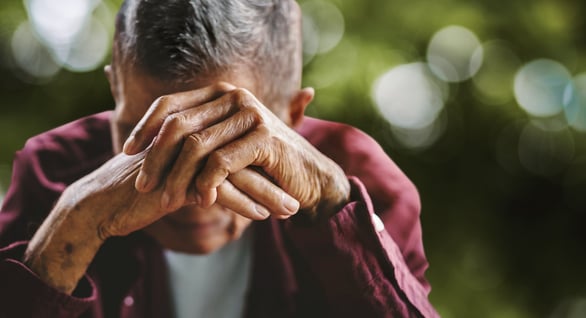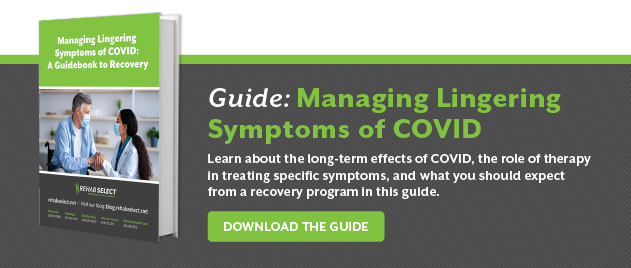
It may seem like the pandemic is almost over. According to the CDC, in March of 2021, hospitalizations are down 70 percent since the January peak. At this time, more than 15 percent of Americans are fully vaccinated, according to a Wall Street Journal report. And almost everyone who wants the vaccine should be able to receive one by May.
But COVID-19 continues to persist longer than a mere two-week cough and social inconvenience for many. For millions, it has been life changing and left them with new problems. Many people who had never suffered isolation, depression, fear, and loneliness before now face the prospect of serious psychological issues like covid depression to go along with the physical symptoms.
As awareness grows, proper treatments emerge. We have created a comprehensive rehab program especially for COVID-19 long-haulers, with unique accounting for the potential psychological effects of the disease. Our therapy program addresses depression and anxiety in five key ways.
New Research Sheds Light on Challenges
Anyone who contracts the disease is at risk for some COVID anxiety and depression, but long-haulers have complex recovery challenges that make them more vulnerable. According to a recent CDC study conducted between August 2020 and February 2021, the percentage of adults with symptoms of anxiety or depression rose from 36.4 percent to 41.5 percent.
Everyone has felt the repercussions from COVID-19. Those who have had the disease, however, face threats to their mental health on many fronts. According to a Lancet article published November 2020, nearly 20 percent of those who had COVID-19 also developed a mental health issue within three months of diagnosis. Those who had COVID-19 were twice as likely as those who had not to develop issues such as covid depression, anxiety, or dementia.
Some are wondering if their symptoms are a new normal. According to an NBC News report, between 10 and 30 percent, as many as 8.4 million, have had lingering symptoms beyond weeks or months. Full recovery has seemed like a moving target for millions of long-haulers. NBC News reported that some of the following lingering symptoms may necessitate ongoing therapy:
- lung damage
- heart damage or inflammation, such as myocarditis or pericarditis
- cognitive impairments that affect memory or concentration
- conditions that affect the blood vessels, such as clotting
- lasting effects from complications, such as heart attacks, stroke, or pulmonary embolism
- anxiety, depression, or trauma
- muscle or joint pain
- chronic fatigue (and muscle weakness)
- Insomnia
We know that COVID-19 manifests first as a respiratory illness, but research shows that its lasting effects are often neurological. That’s why Rehab Select has developed a program that serves the general needs of long-haulers with a special eye toward maintaining psychological health using a range of therapies. Here’s how a specialized therapy program can help:
1. Maintain Muscle to Combat Depression
One of the most common lingering symptoms from COVID-19 is a general loss of energy, muscle weakness in particular. Sometimes, muscle mass has even decreased because of a hospital stay or long bed rest. For obvious reasons, you need a certain level of energy to go about your life and fulfill responsibilities. But, did you know several studies such as this one from the Journal of Geriatrics show a predictive relationship between sarcopenia (loss of muscle mass) and depression?
Our physical therapists design strength training programs with long-haulers in mind, making sure that the major muscle groups get the most efficient stimulus with minimal risk. More importantly, we are able to link patients with experts for telehealth feedback and guidance. Getting strength back with body-weight moves, bands, and machines will boost patients’ mood and improve mobility. Strength training is an important part of our program.
2. Regain Healthy Lungs and Peace of Mind
COVID-19 can cause lung damage due to pneumonia. Shortness of breath is a common symptom for those who can’t seem to fully recover from COVID-19. Your lungs can recover their function, and it is within your power to breath better. We guide patients through diaphragmatic breathing progressions from lying on the back, lying on the stomach, sitting and standing, to breathing through pursed lips, and even singing.
We often recommend deep breathing meditations and yoga specifically for patients suffering from anxiety and covid depression along with shortness of breath. These activities focus on longer and slower breaths out, which lessens the feeling of not being able to take in enough air.
Cardiovascular exercise is another important component to regaining respiratory health and boosting mood. Patients who are feeling unusually low energy need proper guidance from therapists on finding the most effective form of cardio with the least risk.
3. Make Necessary Adjustments to Keep Living Your Life
One of the general reasons for covid depression and anxiety across all populations has been social isolation and disrupted routines. COVID-19 long-haulers have the additional burden of physical limitations to everyday activities. Occupational therapists are here for you to determine what aspects of your routine might be improved by the way you perform them, adding aids when necessary. An example might be something as simple as how one patient can stand on a step-up while doing the dishes to prevent shoulder strain or how another might adjust his/her body angle while vacuuming or mowing the grass to limit fatigue. Some patients might find short-term benefits to using walking aids.
Sleep problems can correlate with and exacerbate other post-COVID-19 symptoms, including depression or COVID anxiety. Our therapists may help you use more energy during the daytime, but they also help you craft an effective sleep routine including lighting choices and sleep positions. With our virtual therapy sessions, you can make more progress toward your goals with the help of an experienced rehab team.
4. Fight Brain Fog With Cognitive Therapy
According to JAMA Viewpoint from September 2020, a study of more than 200 patients hospitalized in Wuhan demonstrated more than one-third experienced “a variety of neurological manifestations.”
Brain fog is not a medical term, but a constellation of symptoms such as mental fatigue, trouble concentrating, memory problems, agitation and confusion. A letter to the New England Journal of Medicine written by doctors in Strasbourg, France, revealed over half of their recent patients had reported confusion and agitation that many would call brain fog.
Cognitive Rehabilitation Therapy is part of our solution to brain fog. Our speech and language pathologists help identify exercises to improve memory processes and rebuild neural pathways. This could include memory training exercises and methods, mental exercises, and speech therapy.
5. Reap the Benefits of Psychological Counseling
PTSD, depression, and anxiety are common post-COVID-19. How do we interpret our physical limitations and fit back meaningfully into our disrupted social and family lives? Our psychologists help patients to interpret the world around them in useful ways to regain a feeling of hope and progress amid this chaotic time. Patients can have sessions virtually or in person to work through covid depression and anxiety.
The long-range effects of COVID-19 and definite causes of related psychological difficulties of long-haulers are yet unknown. What we do know is that an interdisciplinary rehab team is necessary to all of the documented potential paths recovery may need to take. Our program allows patients to benefit from the shared knowledge of occupational, speech, and physical therapists, as well as psychologists.
If you or a loved one is experiencing perplexing ongoing symptoms after having COVID-19, do not hesitate to reach out to experts for help. Covid depression and anxiety are as real as the physical symptoms. Let’s get better—schedule a visit or visit our website to learn more about our COVID Recovery Programs.




